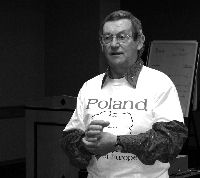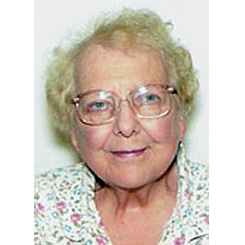 Introduction by Judith Browne and Irene Tomaszewski
Introduction by Judith Browne and Irene Tomaszewski
OXFORD – 2008 PitR attendees will remember one of their last sessions with Norman Davies, when the difficult question of compensation was broached. Professor Davies handed out an article (The Jewish Chronicle, 13 June 2008) about a baroness who planned on suing the Polish government over the loss of her grandfather’s property during World War II. Guiding the group down the tortuous paths of history, the Professor encouraged debate on the question of restitution and compensation through the lens of this particular suit. Following PitR,
Professor Davies met with the Baroness in London, where they discussed this issue and he piqued her curiosity about Galician history, where her grandfather’s Ustrzyki Dolne estate had been. She was unaware of the movements of the Soviet and German armies, the two occupations, the mass population transfers forced by both the Germans and the Soviets, and other aspects of the war as it affected Poland.
The story continues:
OXFORD — In our first encounter, over coffee in Oxford, I overcame the initial difficulties and suspicions, and succeeded in convincing the Baroness that there was more to her family’s story than she was aware of. In particular I explained that her grandfather’s home in Ustrzyki Dolne was occupied in 1939 by the Red Army, not by the Germans, and that in all probability her family’s property had been seized by the Soviet authorities. I was also able to tell her something about the multinational society of the pre-war Galicia, and of the successive tragedies which struck Poles and Ukrainians as well as Jews. With few exceptions, all the Poles were removed from UD by the Soviets, all the Jews were removed in 1942-3 by the Germans, and all the Ukrainians were removed during the Communists’ post-war ‘Operation Vistula’.
As luck would have it, we learned much more later in the summer, in Krakow. In an interview about something completely different, I happened to mention the case of the Baroness to a local journalist. A few days later a letter arrived informing us that a very elderly gent from UD, now 102 years old, was still alive in Krakow and remembered the Fraenkel family well. My wife and I went along to check it out, and found that everything fitted. Professor Eugeniusz Waniek, an artist and art teacher, was born in UD and spent the whole of the war there. (Because of the Nazi-Soviet Pact, the NKVD did not deport Poles who had residential papers from German-occupied Krakow.) Waniek’s sister, Adele, had been a close friend of the Baroness’s aunt, Helena.
The next step was to invite the Baroness to Krakow, and to introduce her to Mr. Waniek. We travelled there at the end of September. The Baroness was accompanied by her daughter Sarah, who is a news producer at the BBC, and by two cousins. We all climbed the stairs to the Professor’s fifth floor studio, and spent an amazing couple of hours talking to a real life witness of times long past. It turned out that the whole of his family had been deported to Siberia, whence only one person, Adele’s daughter, returned, minus her feet which had been amputated through frostbite. We were told in detail about the deportation of the Jews, and about Mr.Waniek’s own ‘repatriation’ to Krakow in 1945. Most astonishingly, the old boy confirmed that he was still in possession of a silver cutlery set, once the property of the Fraenkel family, which had been handed to him for safe keeping by Aunt Helena before she was taken away, and which he now wished to return after nearly seventy years. We then took part in a moving little ceremony, in front of the TV cameras, where a grateful Baroness received her grandparents cutlery, still wrapped in the linen tablecloth which had concealed them all those years ago. The Germans had demanded the surrender of all Jewish valuables on pain of death. And the Baroness understood that Mr.Waniek had risked being shot for not handing the silver over.
The story continues, however. The cutlery set is still in Krakow, since the Baroness needs to obtain an export license for the transfer of antique valuables.
All discussion about the Baroness’s intended lawsuit has been avoided. It is my contention that she must do whatever she thinks best. I divulged the outlines of the Polish Government’s bill on compensation and the restitution of property, which is passing through the Sejm at present. And left it at that. We learned from Mr. Waniek that there had once been two oil refineries in UD, and that one of them appears to have been destroyed. So we don’t yet know to whom the surviving refinery belonged. The final outcome is very far from certain. Nonetheless, it is my opinion that if the Baroness does eventually win some money she should donate it to the village school in Ustryki Dolne. And I did drop the suggestion to her. Watch this space.
CR



